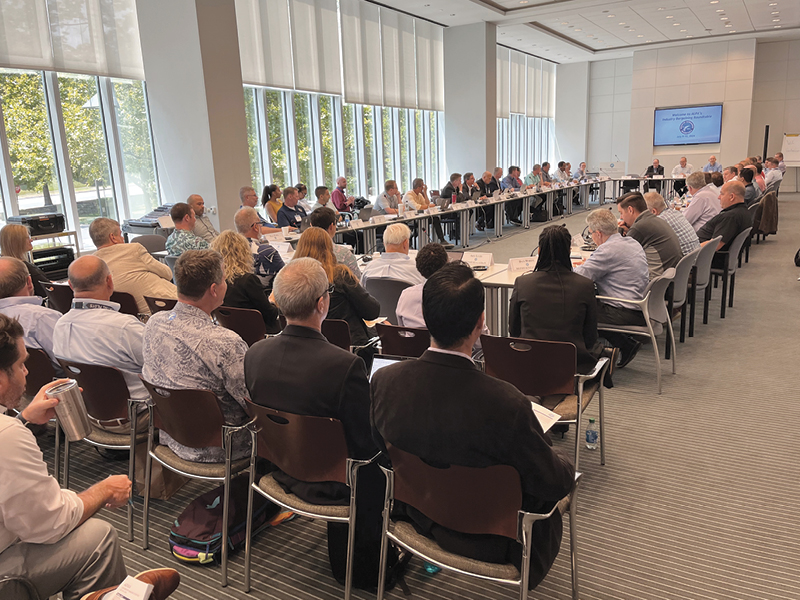Industry Bargaining Roundtable Highlights Latest Negotiating Trends
By John Perkinson, Senior Staff Writer

More than 40 ALPA pilot negotiators gather for the Association’s Industry Bargaining Roundtable at the union’s offices in McLean, Va.
More than 40 ALPA pilot negotiators from 16 pilot groups convened at the Association’s McLean, Va., offices on July 9–10 to take part in the union’s Industry Bargaining Roundtable. Joined by their bargaining colleagues from the Southwest Airlines Pilots Association, ALPA members shared property updates from those in recent and current contract negotiations and participated in interactive presentations and breakout sessions. These activities provided attendees a better understanding of trends in both collective bargaining and agreement implementation, with special considerations given to maximizing pilot compensation and quality of life.
Capt. Doug Grant (Hawaiian), an ALPA executive vice president and Collective Bargaining Committee member, opened the two-day session by reminding participants, “We’re more successful at the table when we work together and build on each other’s success. This depends upon your active participation in events like this.” He shared roundtable moderator responsibilities with Andrew Shostack, director of ALPA’s Representation Department, and Jeff Loesel, the department manager.
Capt. Jason Ambrosi, ALPA’s president, who addressed the group later in the conference, emphasized, “It’s important that we get together and find out what each other’s priorities are and debrief on the gains we continue to make with each new agreement,” to execute ALPA’s pattern-bargaining strategy. In his remarks, he talked about recent ALPA bargaining successes, the FAA reauthorization legislation, and the Association’s efforts to combat the implementation of reduced-crew operations (RCO).
Following a comprehensive airline industry update from Kye Johanning, director of ALPA’s Economic & Financial Analysis Department, attendees briefed the group on the highlights and challenges of their recent and ongoing bargaining efforts. Participating pilot groups currently in some stage of contract negotiations included Alaska, FedEx Express, Frontier, Hawaiian, JetBlue, Kalitta Air, Spirit, and Western Global. Pilot groups in the implementation stages following successful collective bargaining efforts included Amerijet International, Cargojet, Delta, Envoy Air, Jazz Aviation, Sun Country, United, and WestJet.
In addition to pilot group updates, the roundtable presented an open forum for surveying new bargaining trends and addressing emerging threats. ALPA managing benefits attorney Dan White, lead benefits attorney Kevin Burton, and benefits specialist Celeste Sweeney facilitated a group discussion on emerging opportunities in benefits bargaining, including market-based cash-balance plans (MBCBP), which are currently in development at several U.S. airlines. MBCBPs are a popular new option intended to supplement current 401(k) plans, offering pilots the chance to shield a portion of their excess employer contributions from income taxes.
Participants also learned about threats to bargained safety programs from senior attorney Jay Wells and safety program specialist Elizabeth Roussel. The group reviewed potential new uses (and abuses) of Aviation Safety Action Plan and Flight Operations Quality Assurance data and concerns about changes to the Event Review Committee process. They also discussed ways to establish contractual protections against RCO deployment in tandem with ALPA’s broader regulatory efforts in that area.
For the first time, ALPA’s Industry Bargaining Roundtable offered participants the opportunity to break into smaller discussion groups and focus on hot-button topics for their pilot groups. Issues included maximizing the effectiveness of social media and other communications tools in unity building; best practices for contract ratification; the effective use of private and government mediation services; and the impact of federal, state, and local sick-leave statutes on the bargaining environment. The remaining sessions covered the importance of timing for a successful negotiation and the internal and external factors involved, and internal organizing and building structures for success.
Professional staff from ALPA’s Representation, Legal, Government Affairs, and Communications Departments, as well as pilot representatives from ALPA’s Strategic Preparedness and Strike Committee, joined each of the breakouts to guide the discussion and offer their expertise, highlighting the depth of resources available to ALPA’s pilot negotiators.
“It doesn’t matter who you fly for or what you transport, we all have common priorities when it comes to negotiating a labor agreement that serves our members’ best interests,” said Shostack, “and that’s why it’s so valuable for us to get together.”
Loesel added, “We’re always looking for new opportunities to exchange information and learn from each other to make our bargaining efforts stronger, and experience shows that this kind of direct contact is the best way to do that. We’re already planning for next year’s event.”

